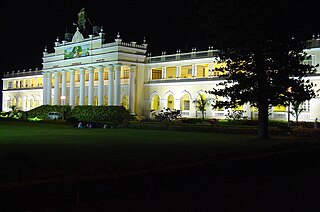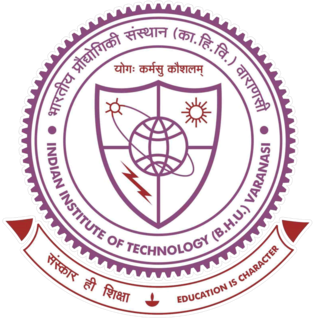
The Indian Institute of Technology Kanpur is a public institute of technology located in Kanpur, Uttar Pradesh, India. As an Indian Institute of Technology (IIT), it was declared an Institute of National Importance by the Government of India under the Institutes of Technology Act.

National Law School of India University (NLSIU), or simply the National Law School(NLS), is a public law school and a state university in Bangalore, India. The school is one of the leading law schools in India, consistently ranked #1 in the National Institutional Ranking Framework for law.

Panjab University (PU) is an Indian collegiate public state university located in Chandigarh. Funded through both State and Union governments, it is considered a state university. It traces its origins to the University of the Punjab in Lahore, which was founded in 1882. After the partition of India, the university was established on 1 October 1947, and called East Punjab University. Initially housed primarily at a cantonment in Solan, it later relocated to a newly built campus in Chandigarh, and was renamed Panjab University. It is accredited by NAAC at five star level, with the highest NAAC A++ accreditation grade.

Savitribai Phule Pune University (SPPU), formerly the University of Pune, is a public state university located in the city of Pune, India. It was established in 1949, and is spread over a 411 acres (1.66 km2) campus in the neighbourhood of Ganeshkhind. The university houses 46 academic departments. It has about 307 recognised research institutes and 612 affiliated colleges offering graduate and under-graduate courses. Savitribai Phule Pune University Ranked 12th NIRF Ranking in 2022.

The University of Mysore is a public state university in Mysore, Karnataka, India. The university was founded during the reign of Maharaja Krishnaraja Wadiyar IV and the premiership of Sir M. Visvesvaraya. The university is recognised by the University Grants Commission for offering higher studies degree courses on-campus as well as online. It was inaugurated on 27 July 1916. Its first chancellor was the maharaja himself; the first Vice-Chancellor was H. V. Nanjundaiah. This was the first university outside of British administered Indian provinces, the sixth in the Indian subcontinent as a whole, and the first in Karnataka. It is a state university of the affiliating type, and was deemed autonomous within the Republic of India on 3 March 1956, when it gained recognition from the University Grants Commission.

Visva-Bharati, is a public central university and an Institute of National Importance located in Shantiniketan, West Bengal, India. It was founded by Rabindranath Tagore who called it Visva-Bharati, which means the communion of the world with India. Until independence it was a college. Soon after independence, the institution was given the status of a central university in 1951 by an act of the Parliament.

Indian Institute of Technology Varanasi(IIT-BHU) is a public technical university located in Varanasi, Uttar Pradesh, India. Founded in 1919 as the Banaras Engineering College, it became the Institute of Technology, Banaras Hindu University in 1968. It was later designated an Indian Institute of Technology in 2012. IIT (BHU) Varanasi has 16 departments, 3 inter-disciplinary schools and a Humanities & Social Sciences Section. It is located inside the Banaras Hindu University Campus.

Rajiv Gandhi School of Intellectual Property Law, IIT Kharagpur is a law school located in Kharagpur, West Bengal, India. An academic unit of Indian Institute of Technology Kharagpur, it is the first law school to be established in an Indian Institute of Technology (IIT). It was set up in collaboration with the George Washington University Law School, Washington DC and is the only law school within the IIT system. It is also the first law school in India imparting full-time Intellectual Property education along with other regular courses prescribed by the Bar Council of India. School maintain a Legal Aid and IP Facilitation Cell to provide legal services to the needy peoples, faculty and students of the school associated with the cell provide legal aid as an enabling and outreach activity.

National Institute of Technology Hamirpur is a public technical university located in Hamirpur, Himachal Pradesh, India. It was declared to be an Institute of National Importance by the Government of India under the Institutes of Technology Act.

BIT Sindri, is an affiliated engineering college in Sindri, Jharkhand, India. Established in 1949, BIT Sindri is one of the oldest engineering and technological institute in India. BIT Sindri emerged as rank 1 in the East Zone and 9th in engineering colleges of the country in the Internshala Annual College Ranking 2023.

The University of Kalyani, established in 1960, is a Government of West Bengal administered, UGC affiliated, NAAC accredited, collegiate public research university in Kalyani, West Bengal, India. It offers courses at the Undergraduate, Postgraduate and Doctoral levels.

Babasaheb Bhimrao Ambedkar University is a Central University situated in Lucknow, Uttar Pradesh. The university is named after B. R. Ambedkar, social reformer, polymath and the architect of the Indian Constitution. The university was established on 10 January 1996. The university has a satellite campus at Amethi too, which was established in 2016.

The University of Burdwan is a public state university located in Purba Bardhaman, West Bengal, India. It was established by the West Bengal Government as a teaching and affiliating university on 15 June 1960 with six graduate departments and 30 undergraduate colleges spread over three districts that come under the jurisdiction of the university. The university currently offers more than 30 undergraduate and 66 postgraduate courses. It has grown as the second largest state university in West Bengal after University of Calcutta. Over the years, the University has consistently performed in the NIRF ranking by securing rank within top 100 under ‘University’ Category and occupied the rank of 89, 92, 85 and 87 in the years 2019, 2020, 2021 and 2022 respectively.

National Law University, Delhi (NLUD) is a law school in India, situated in Sector-14, Dwarka, Delhi. It offers courses at the undergraduate and postgraduate levels. As one of the national law schools in India, NLUD is built on the five-year law degree model proposed and implemented by the Bar Council of India. The National Law University, Delhi, Act, 2007, provides for the Chief Justice of India or Senior Supreme Court Judge of his/her choice to be the university's visitor, the Chief Justice of the High Court of Delhi to function as the university's chancellor, and its vice-chancellor to function as the chief administrator.

Kalasalingam Academy of Research and Education (KARE), formerly Arulmigu Kalasalingam College of Engineering and Kalasalingam University, is a private deemed to be university located in Krishnankoil near Rajapalayam in Tamil Nadu, India. The campus is close to the ancient temple town of Srivilliputhur.

Higher education system in India includes both public and private universities. Public universities are supported by the union government and the state governments, while private universities are mostly supported by various bodies and societies. Universities in India are recognized by the University Grants Commission (UGC), which draws its power from the University Grants Commission Act, 1956. The main governing body is the University Grants Commission, which enforces its standards, advises the government, and helps coordinate between the center and the state. Accreditation for higher learning is overseen by various autonomous institutions established by the University Grants Commission (UGC).

Indian Institute of Management Kashipur also known as IIM Kashipur, is a public business school located in Kashipur, Uttarakhand, India. It is one of the thirteen Indian Institutes of Management the government has set up during the Eleventh Five-Year Plan. The foundation stone of the institute was laid on 29 April 2011.

The Birla Institute of Technology and Science, Pilani is a private deemed university in Pilani, Rajasthan, India. It focuses primarily on higher education and research in engineering and sciences. BITS Pilani was one of the first six institutes in India to be declared Institution of Eminence. According to 2012 data, BITS Pilani has an acceptance rate of 1.47%, making it one of the most exclusive technical universities in the world.

National Institutional Ranking Framework (NIRF) is a ranking methodology released annually by the Ministry of Education, Government of India, to rank institutions of higher education in India. The framework was approved by the former Ministry of Human Resource Development and launched by the Minister on 29 September 2015.

Maharashtra National Law University, Nagpur (MNLU) is a National Law University and a public law school established by the government through the Maharashtra National Law University Act. The university is the 19th National Law University established in India and is located in the Orange City of Nagpur, Maharashtra. Hon'ble Supreme Court Justice Bhushan Ramkrishna Gavai serves as the chancellor of the institution.























